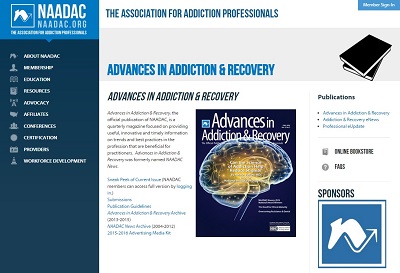People suffering from addictions are not morally weak; they suffer a disease that has compromised something that the rest of us take for granted: the ability to exert will and follow through with it.
– Nora D. Volkow, M.D
 Nora D. Volkow, M.D., has written an eloquent, state-of-the-science essay on addictions treatment that is a must-read for all people struggling with addictions, for those who love them, for those who treat them, and for those who represent them. Given the statistics on the prevalence of addiction and its impact on everyone’s lives, that would be all of us.
Nora D. Volkow, M.D., has written an eloquent, state-of-the-science essay on addictions treatment that is a must-read for all people struggling with addictions, for those who love them, for those who treat them, and for those who represent them. Given the statistics on the prevalence of addiction and its impact on everyone’s lives, that would be all of us.
Volkow is Director of the National Institute on Drug Abuse (NIDA) and her essay appears in the Fall 2105 issue of Advances in Addiction & Recovery, the quarterly journal from NADAAC, the association for addictions professionals of which I am a member.
Vokow powerfully expresses the interplay between the felt experience of the person struggling with addiction and the brain science that explains – as simply as I’ve ever read – the complex brain functions that create unbearable feeling states and the resultant behaviors that baffle both the person struggling and everyone else. Given the clarity and compassion with which Volkow expresses difficult concepts, I left a voice mail at NADAAC yesterday asking the organization to please make the full essay available online. It’s currently only available in a .pdf reader which can be reached from here.
I’ve excerpted sections below, about 800 words from the 2600-word essay. I am so deeply grateful to Laurel Sindewald who transcribed the entire essay within hours of my request so I could share excerpts.
To enhance readability, no quotation marks or block quotes are used. The remaining content of this post is comprised of verbatim quotes from “Can the Science of Addiction Help Reduce Stigma?” by Nora D. Volkow, M.D., Advances in Addiction & Recovery, Fall 2015 issue, pages 16-17, 19:
One of the terrible consequences of the slow acceptance of the brain disease model of addiction has been the low rate of adoption of methadone and buprenorphine. Since they are, themselves, opioids, they continue to be viewed as a “crutch,” and do not fit with erroneous but all-too-common perceptions that the addicted person must simply have the strength to endure sobriety, without aid, from day one. This comes from a failure to understand that the brain, which is comprised of the various self-control and reward circuits involved in addiction, is an organ like any other in the body (albeit much more complex), requiring time as well as support to heal. In fact, we do not ask a person who has suffered severe injury as a result of a car accident to walk without aid while their bones engage in self-repair; external support – often, crutches – are needed to take the burden off healing limbs. In some cases long periods of rehabilitation, lasting years, may be needed after accidents, to restore functioning that was lost. Brain diseases are no different.
This ensemble of brain changes [involving not only the reward regions but also several other brain circuits that are involved with executive function including self-control, the processing of negative emotions and memories, and the shaping of behavior through conditioning] could be likened to a broken video game. Because of the conditioning processes described above, the addicted person’s world is like a threatening virtual environment, a landscape calculated to pose maximal threats to their sobriety – in the form of drugs and drug cues – around every corner and lurking in every shadow. Yet the person playing the game must navigate this environment with a broken controller, such that no matter how hard they try to steer clear of hazards, their game-world avatar heads straight for the drug that will lead them to relapse.
I often compare drug addiction to another chronic, relapsing disease, diabetes. In diabetes, the pancreas is not able to make the insulin necessary for our cells to use glucose as fuel. No one thinks that, with sufficient willpower, a person with this condition could push through without medication. Their disease, even if it had behavioral antecedents and may have involved free choices in a person’s past – such as decisions about food or exercise – has a physical basis and requires medical management once it has developed. Fortunately, people often have a basic understanding that the diseased pancreas is the reason people with diabetes require constant medication, and thus no one questions when a person with diabetes excuses themselves before meals to take insulin or requires snacks at odd times. Drug addiction, despite decades of effort, still has not attained an equivalent level of social understanding: Just as the diseased pancreas cannot supply sufficient insulin, the brain affected by addiction cannot supply sufficient self-control, and the addicted person requires medical management – not judgment – to recover and lead a normal life.
People suffering from addictions are not morally weak; they suffer a disease that has compromised something that the rest of us take for granted: the ability to exert will and follow through with it. The desire to be rid of the drug and its destructive influence on their life and health and relationships is usually quite sincere, but the ability to follow through on the choice not to use the drug has been compromised by their disease. I have seen all too often how the cycle of relapse, and the shame and self-disappointment this disease produces can robe a person of hope and even, in extreme cases, the will to continue living.
Reducing the stigma that still surrounds drug addiction and its treatment requires getting across to the public, including policymakers, physicians, and addicted persons and their families, the complex nature of this condition. The complexity is not only biological but also philosophical, because it affects how we think about our own free will. It requires understanding that something as basic as our ability to make and follow through with choices in our own best interest is rooted in biological mechanisms that can become disrupted by drugs and, in some cases, compromised by a chronic disease.
[End of excerpts from “Can the Science of Addiction Help Reduce Stigma?” by Nora D. Volkow, M.D., Advances in Addiction & Recovery, Fall 2015 issue, pages 16-17, 19.]
